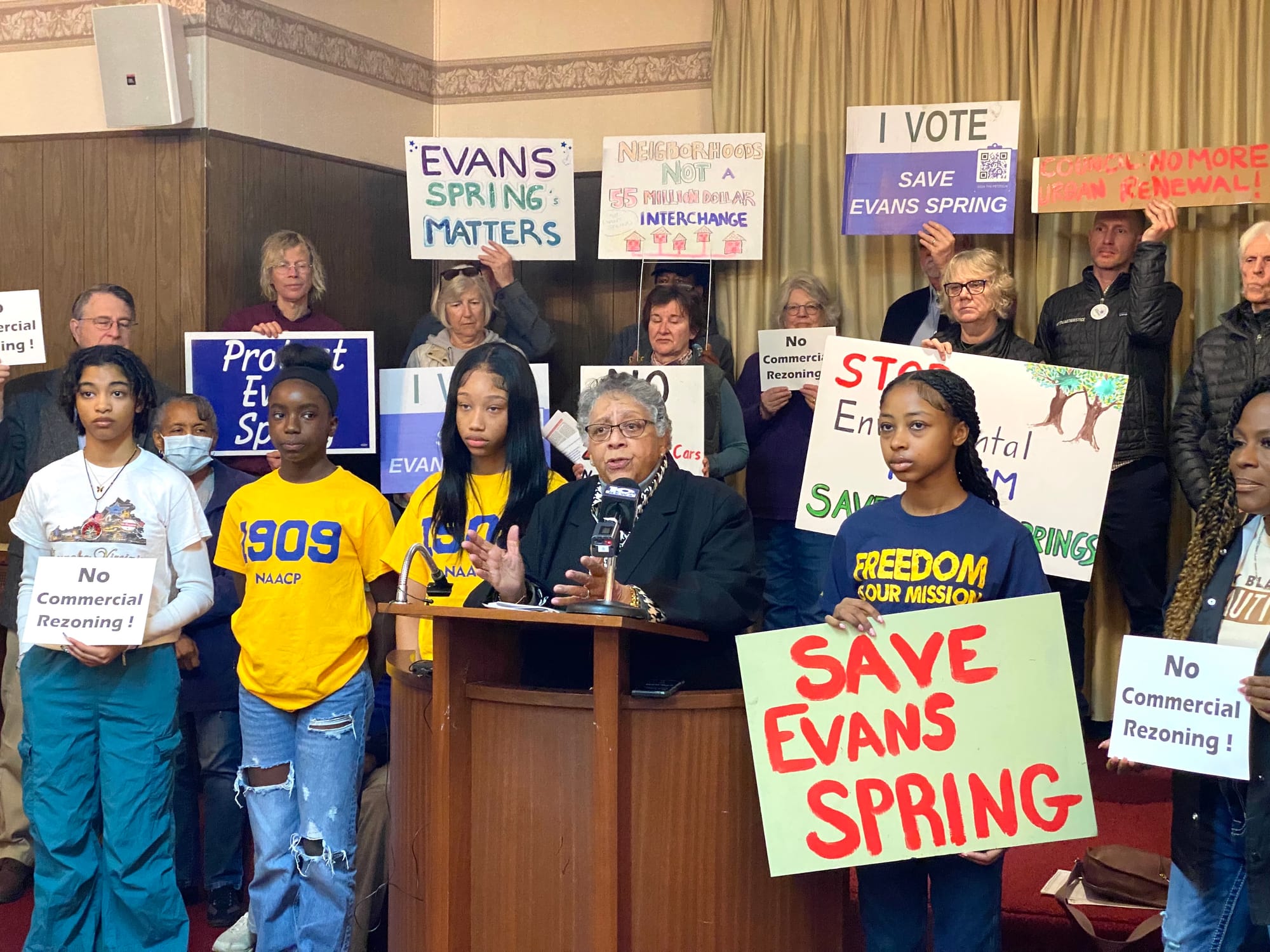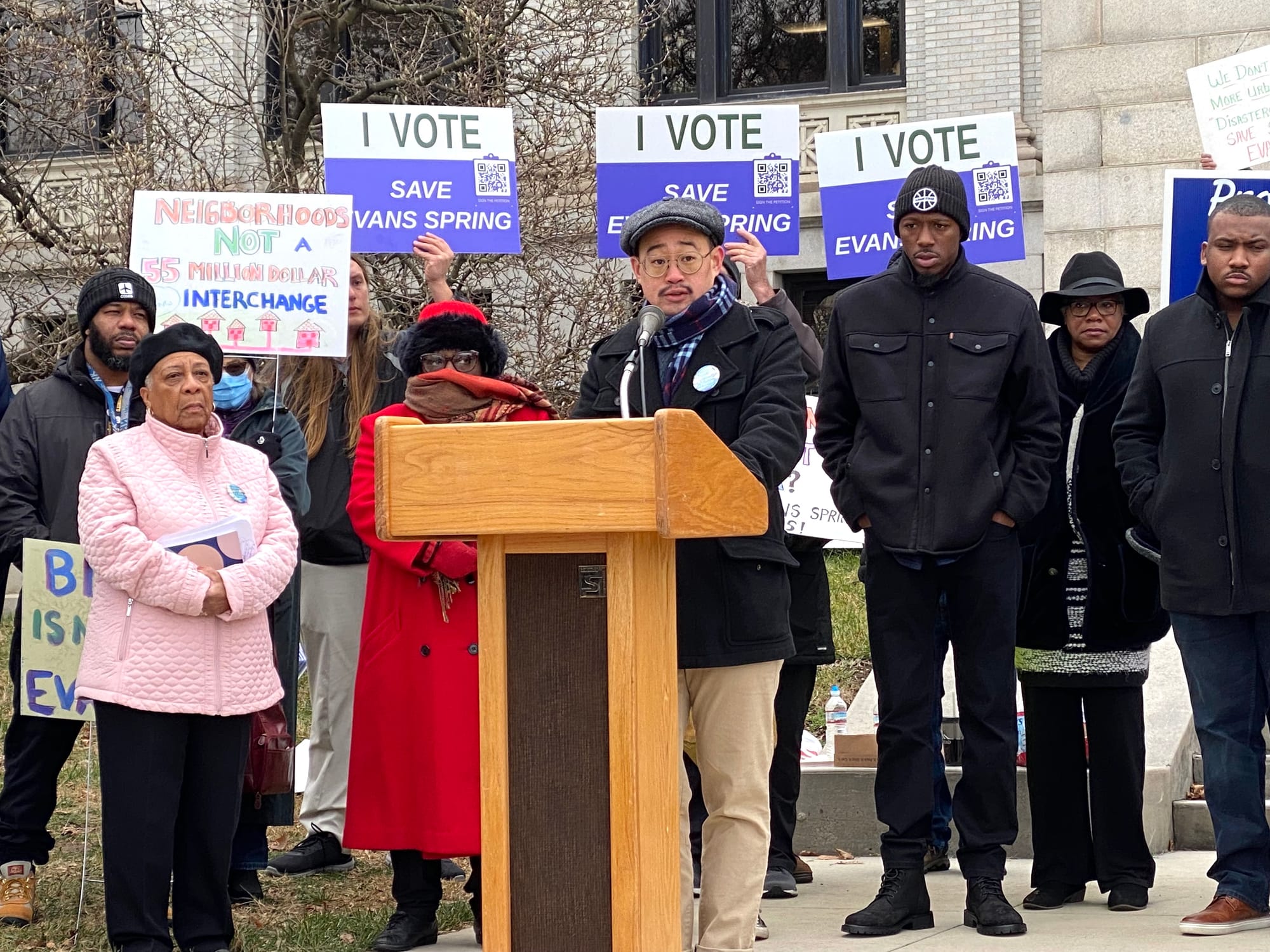Roanoke Leaders, Residents Tangle Over Evans Spring As Activists Ratchet Up Pressure
City Council is nearing a vote on whether to incorporate a development plan into Roanoke's master plan.

Roanoke leaders and residents clashed this week over the fate of Evans Spring as City Council nears a vote on whether to adopt a development plan for the land.
A consultant’s plan proposes the 150-acre-woodlands across Interstate 581 from Valley View Mall should host a mix of big box stores, smaller shops, and hundreds of homes and apartments.
Private property owners, the city and Roanoke’s Economic Development Authority agreed to spend up to $225,000 for the development plan. Council is set to vote Feb. 20 on incorporating that document into the city’s master plan after a Feb. 12 planning commission vote.
Yet many residents oppose large-scale development — leading in recent days to calls for retribution at the ballot box, pushback from a visibly frustrated mayor and warnings from Council members that misinformation is pervading debate over the land.
Local civil rights leaders on Saturday pledged to campaign against any member of Council who votes to develop Evans Spring. (No developer has pitched a formal plan; a 2019 proposal fizzled after planning commissioners expressed skepticism.)
“If you vote to develop this land, I am going to campaign that we do not vote you back into office,” said Olivia Davoll, president of the Roanoke branch NAACP Youth Council, who is 18 and lives in Roanoke County.
“We need to be heard, and this needs to be stopped, right now,” Brenda Hale, president of the local NAACP branch, added. “I know we have heard that the mayor is [retiring], but Mr. Mayor, please still be concerned about our children right now. Anybody else that's not going to be reelected on City Council, be concerned about these children, right now.”
City leaders are eyeing the possibility of millions in annual tax revenue if a developer comes forward with a proposal similar to what the master plan describes. In Roanoke, Evans Spring is the largest swath of what the city calls “developable vacant land.”
Discord broke out at Monday’s City Council meeting after a presentation from Theo Lim, a Virginia Tech professor whose graduate students worked over 15 months with members of the advocacy group Friends of Evans Spring.
“We wanted to understand how residents see their own community and the future of Evans Spring,” Lim, an assistant professor of urban affairs and planning, told Council members. “These are not questions that can be answered using rationality alone. They are emotional in nature.”
The pain of urban renewal and freedom associated with nature emerged as themes, and Lim said students and residents came to realize “the issue was not Evans Spring, per se, but rather a deeper issue of trust, and community engagement.”
Lim suggested the city adopt 10 principles for community engagement as a way for the local government to restore trust, particularly with the Black community.
Council members Stephanie Moon Reynolds and Luke Priddy sponsored Lim’s 10-minute presentation, and as Lim’s buzzer sounded, Mayor Sherman Lea banged his gavel and cut Lim off.
“I’m disappointed — and all due respect to you, Dr. Lim — I’m disappointed with what Mr. Priddy and Ms. Moon Reynolds have presented here,” Lea said. “I haven’t heard one word about trees. And I think if that's what you were brought in to talk about, that's what should be done, not to come in and give us a lecture on community engagement.”
Moon Reynolds said she was never told the presentation would be about trees, and noted that Lim’s PowerPoint presentation focused on community engagement was available publicly Thursday.
“That’s what was told to me,” Lea said. “So if this is a backdoor way to get something else done, I don’t appreciate it.”

As part of the consultant’s master plan, a Richmond-based firm conducted community outreach that many residents decried as lacking. A Charlottesville company, Land Planning and Design Associates, finalized the master plan in December, shortly after all of LPDA’s employees were hired by Kimley-Horn, one of the nation’s biggest planning, engineering and design firms.
After Lim’s presentation, a half dozen residents spoke against development and encouraged city leaders to acquire the properties and transform Evans Spring into a park.
“I am disappointed Dr. Lim could not finish his remarks,” resident Jennie Waering said. “I'm just sort of appalled at the apparent attitude this Council has made during his remarks about Evans Spring.”
Councilman Peter Volosin said “there’s a lot of misinformation” about Evans Spring. He cited a belief that the city has already earmarked money for a necessary highway bridge that the plan says could cost from $54 million to $75 million, as well as a news story that erroneously said a rezoning vote was this month.
“I keep hearing the term ‘urban renewal’ thrown around,” he said. “This is not urban renewal. It is nowhere near what we did in the 1950s and ’60s.”
Councilwoman Trish White-Boyd agreed with Volosin that “we are also dealing with a lot of misinformation.” She said trauma from some in the Black community and guilt from some in the white community have contributed to conversations around the issue.
“There's a lot of healing that hasn't happened, a lot of trauma that hasn't been addressed,” Vice Mayor Joe Cobb said. “This is probably one of the hardest decisions that any of us will make — and we make a lot of hard decisions — but there is a complexity to it that is part of the healing.”

